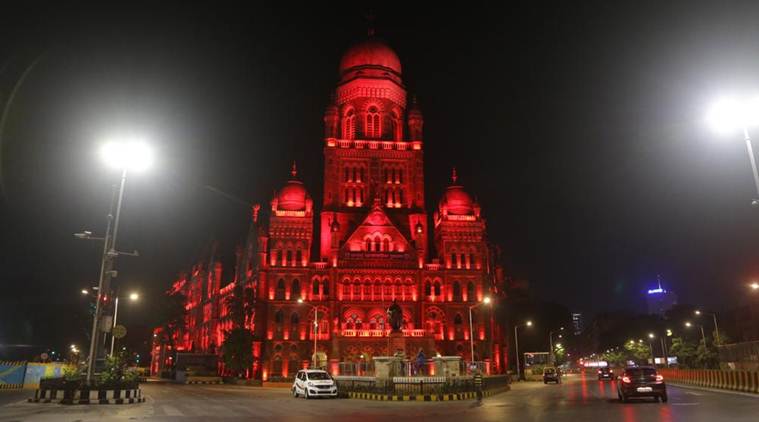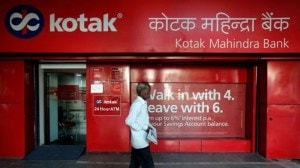- India
- International
Mumbai lockdown: ‘Unprecedented but necessary’
When the Railways announced the closing down of suburban services to prevent the spread of COVID-19 on Sunday, it was a decision that was taken reluctantly and put off until the last minute, after a series of other steps taken to minimise the movement of people.
 Chhatrapati Shivaji Maharaj Terminus on Sunday. (Express photo/Prashant Nadkar)
Chhatrapati Shivaji Maharaj Terminus on Sunday. (Express photo/Prashant Nadkar)
“Get the railways back up if possible, it is a message to the terrorist” was the message sent by then Prime Minister Manmohan Singh to officials of Western Railway (WR) after trains were hit by a series of seven blasts in a span of 11 minutes. The first train began operations within the next four hours, signifying the undying and unstopping spirit of the city. That was in July 2006.
When the Railways announced the closing down of suburban services to prevent the spread of COVID-19 on Sunday, it was a decision that was taken reluctantly and put off until the last minute, after a series of other steps taken to minimise the movement of people.
On Sunday, during the Janata Curfew, both Central Railway (CR) and WR operated trains on Sunday with limited frequency. It catered to thousands of nurses, sanitation workers, security personnel and policemen ferrying them to work.
Multiple entry and exit points of the station were either barricaded or manned by personnel from Government Railway Protection force (GRP) who checked the ID cards of every person before allowing anyone to enter the station premises. Kailash Sonavne, a GRP personnel deployed at Byculla station, however, was apprehensive of the scheme being a success in the long run. “We stopped some boys from entering through the gates, and they found their way in through the broken boundary wall,” said Sonavne.
It was a major relief to Sonavne and hundreds of other GRP personnel like him after it was announced that trains will be completely shut from Monday until March 31, along with long-distance trains. “The shutting down of local trains in Mumbai is an unprecedented move and an absolutely necessary one. We should never expose ourselves to community transmission and railway is the most fertile ground for it,” said Vivek Sahai, who retired as the Chairman of Railway Board and was crucial in getting trains on WR up and running after the 2006 serial blasts.

But for Arun Jadhav, a resident of Badlapur, who works as a sanitation worker in Byculla, trains are the only way to reach work. On Sunday, Jadhav was given leave early, as there were fewer trains. “I’ll be provided buses to commute, but our travelling time will be nearly double, and morning shift of 6 am will not be possible,” said Jadhav, who will have to change at least three buses to reach work from Monday.
Meanwhile, for Smita Deepal Kumari, who works as a security guard at a prominent hotel in South Mumbai, there is no way to reach work from Bhandup. Smita was allowed to travel on Sunday after showing an ID card. “We will have to stay at home. We have not been told if we will be paid for the day or if our salary will be cut,” said Smita, who has a family of five to feed.
The decision to shut local services was taken on Sunday after days of appeal to commuters to not travel unless necessary. The number of daily average travellers had dropped to 25 lakh on WR from a daily average of 35 lakh, while on CR it came down to 26 lakh from 45 lakh, but the numbers are still alarmingly high. Spread across 319 km, the suburban local ferries over 7.8 million passengers every day.
“Coronavirus can create a crisis worse than the terrorist attack or the deluge that has crippled the city’s lifeline in the past – shutting (the railways) down is for the greater good of people,” said S B Ghosh Dastidar, who helmed affairs of CR as its General Manager during the deluge of 2005. It’s been nearly 15 years since then that the train operation in Mumbai will be shut for nine days, from March 22 to 31st. Even during the flood of 2005, while it took CR close to five days to get trains moving, its counterpart WR was up and running within 30 hours.
Over the past week, there have been over 30 cases of passengers with home quarantine marks being deboarded from trains and some being apprehended near local platforms.
While the necessity of the move to shut down local trains remains undisputed, thousands of others who depend on it are looking at severe losses. For Pradeep Agarwal who runs a chain of food stalls at railway stations, his regular business of around Rs 15,000 per day will be hit. It had already come to Rs 4,000 per day in the past week. “We understand the gravity of the situation and the necessity to shut down shops, but the railways should think of giving some exemption in its license fees for the month,” Agarwal said. Thousands of porters and hundreds of other traders, such as shoe shiners at the station, who were made to shut down shop for the next one week, have no other source of revenue for their subsistence.
From Monday until March 31, it would be the buses of Brihanmumbai Electric Supply and Transport (BEST) undertaking and Maharashtra State Road Transport Corporation (MSRTC) which will be pressed to ferry essential workers to their work place. MSRTC buses will bring down people from areas like Palghar, Vasai, Virar and Nalasopara from western suburbs, Aasangaon, Badlapur, Ambernath, Kalyan and Dombivali on eastern suburbs and Panvel on the harbour line to interchange points from where BEST buses will take them to different areas within the city.
Apr 24: Latest News
- 01
- 02
- 03
- 04
- 05







































